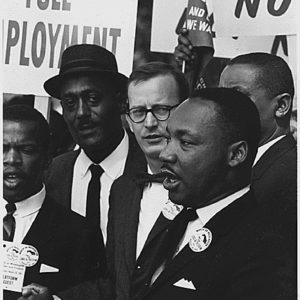Martin Luther King Jr. Day, which is January 21 this year, became a public holiday in 1983, after President Ronald Reagan signed the legislation establishing it.
The quiz below, from the Ashbrook Center at Ashland University in Ohio, provides an opportunity for you to test your knowledge of the Reverend King and the modern civil rights movement, which took shape in the 1950s and 1960s when a confluence of social and economic factors enabled political change.
1. In what well-known sermon did the Rev. Martin Luther King Jr. suggest “withdrawing economic support” from businesses to obtain fair treatment?
A. The Death of Evil Upon the Seashore
B. I’ve Been to the Mountaintop
C. I See the Promised Land
D. The Drum Major Instinct
2. In 1966, President Lyndon Johnson held a White House conference on civil rights. Which African-American civil rights activist was the conference’s honorary chairman?
A. A. Philip Randolph
B. Ralph Abernathy
C. W.E.B. Du Bois
D. Huey Newton
3. Who was convicted of assassinating Martin Luther King Jr.?
A. Sirhan Sirhan
B. James Earl Ray
C. Thomas Hagan
D. Lee Harvey Oswald
4.Which of the following civil rights activists was not assassinated?
A. Malcolm X
B. Rosa Parks
C. Medgar Evers
D. Fred Hampton
5. Martin Luther King Jr. was the author of which book or books?
A. Strength to Love
B. Why We Can’t Wait
C. The Measure of a Man
D. All of the above
6. In 1954, the Supreme Court ruled unanimously in Brown v. Board of Education that segregation in public schools was illegal. Appeals of cases from what five U.S. locations were combined into one case by the justices?
A. Kansas, Mississippi, North Carolina, Texas and Washington, D.C.
B. Alabama, Kansas, Ohio, South Carolina and Virginia
C. Delaware, Kansas, South Carolina, Virginia and Washington, D.C.
D. Kansas, Kentucky, Louisiana, North Carolina and Virginia
7. What future Supreme Court justice argued Brown v. Board of Education before the Supreme Court?
A. Sandra Day O’Connor
B. Thurgood Marshall
C. Ruth Bader Ginsburg
D. Warren Burger
8. After refusing to give up her bus seat to a white passenger, civil rights activist Rosa Parks inspired African-Americans to boycott public buses for more than a year in what city?
A. Selma, Alabama
B. Birmingham, Alabama
C. Tuscaloosa, Alabama
D. Montgomery, Alabama
9. Time magazine said the landmark Civil Rights Act of 1964 bore which senator’s “handiwork more than anyone else’s.”
A. Clair Engle of California
B. Hubert Humphrey of Minnesota
C. Everett Dirksen of Illinois
D. Mike Mansfield of Montana
10. Which musician did not perform at the 1963 March on Washington (for Jobs and Freedom), where Martin Luther King Jr. delivered his famous “I Have a Dream” speech?
A. Stevie Wonder
B. Joan Baez
C. Bob Dylan
D. Marian Anderson
Answers: 1-C, 2-A, 3-B, 4-B, 5-D, 6-C, 7-B, 8-D, 9-C, 10-A

